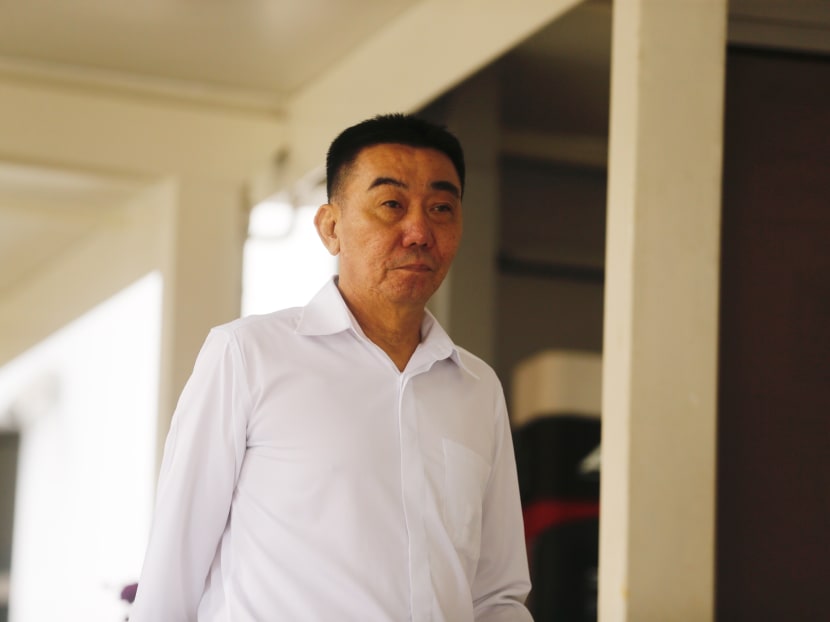Slashing of mistress’ lover: Prosecution breached disclosure obligations and conviction is ‘unsafe’, lawyer argues in appeal
SINGAPORE — The lawyer for a businessman found guilty of hiring hitmen to slash his mistress’ boyfriend argued on Wednesday (Oct 28) that because prosecutors had failed to disclose a witness statement, it was not safe to convict him.

Lim Hong Liang (pictured) was jailed six years in 2019 for conspiring to cause grievous hurt to Mr Joshua Koh Kian Yong, but he filed an appeal against his conviction and sentence.
- Lim Hong Liang was found guilty of conspiring to slash the face of his mistress’ boyfriend
- He then appealed in the High Court against his conviction
- His lawyer argued that the conviction should not stand because the prosecution did not divulge a witness statement as an obligation
SINGAPORE — The lawyer for a businessman found guilty of hiring hitmen to slash his mistress’ boyfriend argued on Wednesday (Oct 28) that because prosecutors had failed to disclose a witness statement, it was not safe to convict him.
High Court judge Aedit Abdullah reserved his judgement, in order to consider how the prosecution’s potential breach of its disclosure obligations would impact the case.
Lim Hong Liang, 57, was sentenced to six years’ jail last year. He then filed an appeal.
He and another man, Ong Hock Chye, were found guilty in a district court of conspiring to cause grievous hurt to Mr Joshua Koh Kian Yong, 35.
Lim was said to have grown jealous that Ms Audrey Chen was dating Mr Koh. He then allegedly ordered two men to attack the younger man on April 8, 2016.
When Mr Koh and Ms Chen went on the run from Lim afterwards, three attackers caught them having supper at Little India and slashed Mr Koh’s face with a penknife.
Lim is represented by Senior Counsel N Sreenivasan and Mr Partheban Pandiyan from K&L Gates Straits Law.
DISCLOSURE OBLIGATIONS
The appeal was originally heard in January this year, but before Justice Aedit could give his decision in April, Lim’s lawyer N Sreenivasan sought to make further arguments in light of a new Court of Appeal decision.
In that decision, which concerned drug trafficker Muhammad Nabill Mohd Fuad, the apex court ruled that the prosecution is duty-bound to disclose a material witness' statement to the defence, regardless of how it would affect the accused person.
Earlier in 2015, the Court of Appeal had already issued a landmark judgement on the prosecution’s duty to disclose evidence before trial.
This is known as the Kadar disclosure obligations, named after the accused persons in the judgement.
Prosecutors must divulge any unused material that can be reasonably regarded as credible and relevant to an accused person’s guilt or innocence.
The prosecution must also hand over such material that is likely to be inadmissible as evidence, but would give a real chance of pursuing a line of inquiry that leads to admissible and likely relevant evidence.
ARGUMENTS
In Lim’s case, the prosecution conceded that the witness statement — given by Lim’s nephew known only as Edwin — should have been disclosed under its Kadar obligations.
However, they denied deliberately breaching their obligations, saying that the trial prosecutors had made a genuine error and thought the option was open to Lim to call his nephew to give evidence.
Another of Lim’s nephews, Ron Lim De Mai, had testified that Edwin was there when the other suspect Ong contacted Ron Lim.
Edwin was not a witness during the trial but the prosecution had offered him as a witness to the defence.
Ron Lim was sentenced to three years' jail and four strokes of the cane for taking part in the first attack on Mr Koh.
Justice Aedit ruled in August that the statement by Edwin cannot be used as evidence, unless Lim’s lawyers admit it as evidence.
However, he said that the lawyers can use it to convince the court if the prosecution’s failure to disclose it should render the conviction unsafe, or if an adverse inference should be drawn against the prosecution.
Three main potential consequences of non-disclosure are that:
It renders the conviction unsafe due to misconduct
The prosecution’s case was not made out beyond a reasonable doubt
An adverse inference may be drawn
During a two-hour hearing on the conviction appeal on Wednesday, Senior Counsel Sreenivasan said that the failure to disclose Edwin’s statement was deliberate and egregious, amounting to “a material irregularity”.
Other irregularities included the district judge’s failure to order the disclosure of the statement.
However, Deputy Public Prosecutor (DPP) Lee Lit Cheng argued that while they had breached their disclosure obligations, there was no misconduct or any evidence that the late disclosure should render the conviction unsafe.
The statement also does not show whether Lim was innocent or guilty, and there was other evidence to prove his guilt such as phone text messages that Lim sent to Ms Chen after the first attack, DPP Lee added.
Senior Counsel Sreenivasan responded that the prosecution was mischaracterising the issue and had shown “no remorse and no repentance”.
“There is a higher principle involved in this case — the sanctity of the process,” he added.
Justice Aedit told the court that he will likely give his judgement next year.
Lim remains out on bail in the meantime.











